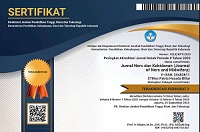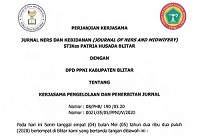Pengaruh Relaksasi Otot Progresif terhadap Penurunan Ansietas dan Peningkatan Kualitas Tidur Pasien Neurosa di Wilayah Kerja Puskesmas Kepanjen Kidul Kota Blitar
DOI:
https://doi.org/10.26699/jnk.v2i2.ART.p154-163Keywords:
Progressive Muscle Relaxation, Anxiety, Sleep Quality, NeurosaAbstract
Neurosa a psychic reaction with typical anxiety where clients are in fear that unconsciously displayed in various forms of behavior. Anxiety can leads physical imbalance such as increased blood pressure, insomnia, muscle tension and palpitations. Muscle tension and sleep difficulties are often experienced anxiety response. Some psychotherapy can be given to clients of anxiety one of which is progressive muscle relaxation therapy. The  aims of this study was to determine the effect of progressive muscle relaxation therapy to decrease anxiety and improve the quality of sleep in patients neurosa in Health Center Area Kepanjen Kidul Blitar. Research design was quasy experimental Pre-Post Test With Control Group with purposive sampling. Number of samples 26 respondents were divided into control and treatment groups. Collecting data using questionnaires that have tested the validity and reliability. Results of analysis of anxiety and sleep quality was obtained p <0.05 in the treatment group and control before and after treatment, the difference in scores of anxiety and sleep quality of patients neurosa between the treatment group and the control group after a given intervention p <0.05. There is no correlation between the anxiety with the quality of sleep with p> 0.05. Therapy progressive muscle relaxation and deep breathing therapy can be used to reduce anxiety and improve sleep quality in patients neurosa.References
Arntz, A. 2003. Cognitive therapy versus applied relaxation as treatment of generalized anxiety disorder. Journal Behaviour Research and Therapy, 41 (633–646).
Bussye, D.J., Reynolds, C.F., Monk, T.H et al. (1989). The Pittsburgh Sleep Quality Index (PSQI): A New Instrument for Psychiatric Research and Practice Psychiatry Research, 28 (193-213).
Bephage, G. (2005). Promoting Quality Sleep in Order People: The Nursing Care Role. British Journal Nursing, 14(4).
Badan Penelitian dan Pengembangan Kesehatan Departemen Kesehatan RI. 2007. Laporan Nasional Riset Kesehatan Dasar. www. riskesdas. litbang depkes. go.id. diakses tanggal 2 Februari 2015.
Bebbington, P.E., Brugha, S., Meltzer, H et al. 2000. Neurotic Disorders and The Receipt of Psychiatric Treatment. Journal Psychological Medicine, 30(1369-1376).
Bush, L.A., Armento, E.A., Weiss.J.B et al. (2012). The Pittsburgh Sleep Quality Index in Older Primary Care Patients With Generalized Anxiety Disorder: Journal Psychometrics and outcomes following cognitive behavioral therapy Psychiatry Research, 199 (24–30). www.elsevier.com/locate/psychres
Colten, R., Harvey., Altevogt, M.B. (2006). Sleep Disorders and Sleep Deprivation: An Unmet Public Health Problem. Washington, DC: The National Academic Press.
Conrad, A., Roth, W.T. 2007. Muscle Relaxation Therapy for Anxiety Disorders: It Works But How?. Journal of Anxiety Disorders, 21 (243–264).
Dogan, O., Ertekin, S., Dogan, S. et al. (2005). Sleep Quality in Hospitalized Patients. Journal of Clinical Nursing, 14 (107-113).
Frisch, N.C & Frisch, L.E. 2006. Psychiatric Mental Health Nursing (3th ed). New York: Thomson Delmar Lerning.
Fontaine, K.L. 2009. Mental Health Nursing (7 th edition). New Jersey: Pearson Education, Inc.
Freeman, D., Garety, P.A. 2003. Connecting Neurosis and Psychosis: The Direct Influence of Emotion on Delusions and Hallucinations. Behaviour Research and Therapy, 41(923–947).
Hardy, S. (2008). A Double Bind: Disturbed Sleep and Depression. Practice Nursing, 9(2).
Judith, T.R., Julie, T.S., and Elizabeth, V.W. (2010). Managing Sleep Disorder in Elderly. Nurse Practitioner, 35 5 (30-37).
Jeong, L.E., Bhattacharyab, J., Sohnc, C., Verresa, R. 2012. Monochord Sounds and Progressive muscle relaxation reduce Anxiety and Improve Relaxation During Chemotherapy. Journal Complementary Therapies in Medicine, 20(409—416). www.elsevierhealth.com/journals/ctim
Kaplan & Sadock. 2007. Sinopsis Psikiatri: Ilmu Pengetahuan Psikiatri Klinis Jilid 1. Jakarta: Bina Rupa Aksara
Keliat, B.A, Akemat. 2010. Model Praktik Keperawatan Profesional Jiwa. Jakarta: EGC.
Kusumawati, F, Hartono.Y. 2010. Buku Ajar Keperawatan Jiwa. Jakarta: Salemba Medika
Loriz, L.M. (2004). Excessive Daytime Sleepiness: How to Help Your Patient Manage. Clinical Excelelence for Nursing Practitioners, 8(2).
Langford , D,J., Lee , K., Miaskowski, C. (2012). Sleep Disturbance Interventions in Oncology Patients and Family Caregivers: A Comprehensive Review and Meta-Analysis Sleep Medicine Reviews, 16(397-414). www.elsevier.com/locate/smrv
Maramis, W.F. 2006. Catatan Ilmu Kedokteran Jiwa. Surabaya: Airlangga University Press.
Notoatmodjo, S. 2010. Metodologi Penelitian Kesehatan. Jakarta: Rineka Cipta.
Nishiyama, T., Mizuno, T., Kojima, M et al. (2014). Criterion Validity of The Pittsburgh Sleep Quality Index and Epworth Sleepiness Scale for The Diagnosis of Sleep Disorders. Journal Sleep Medicine, 15(422–429).
Patlak, M. (2005). Your Guide to Healthy Sleep. U.S. Departement of Health and Human Services: NIH Publication no.06-5271.
Ramdhani, N & Putra, A.A. 2008. Pengembangan multimedia relaksasi. Yogyakarta: bagian psikologis klinis fakultas psikologi UGM
Riegel, B., Weaver, T.E. (2009). Poor Sleep and Impaired Self-Care: Toward a Comprehensive Model Linking Sleep, Cognition, and Heart Failure Outcomes. Eur J Cardiovasc Nurs, 5(337-344).
Stuart, G.W & Laraia, M.T. 2005. Principles and Practice of Psychiatric Nursing (7th edition). St. Louis: Mosby
Stuart, G.W. 2009. Principles and Practice of Psychiatric Nursing (9th edition). St. Louis: Mosby
Tarwoto & Wartonah. 2003. Kebutuhan Dasar Manusia & Proses Keperawatan. Edisi pertama. Jakarta: Salemba Medika.
Townsend, C.M. 2005. Essentials of Psychiatric Mental Health Nursing (3th Ed). Philadelphia: F.A. Davis Company.
Varcolis, E.M. 2006. Psychiatric nursing clinical guide: assesment tools and diagnosis. Philadelphia. W.B Saunders Co.
Videbeck, S.L. 2008. Buku Ajar Keperawatan Jiwa. Jakarta: EGC
Verhaeghe, P., Vanheule , S. 2005. Actual Neurosis and PTSD. Journal The Impact of the Other Psychoanalytic Psychology, 22 4(493–507).
Wilson, S. (2008). A Good Nightâ€s Sleep, Part One: Normal Sleep. Nursing & Residential care, 10 11
Zhao, L., Wub, H., Zhou , X et al. 2012. Effects of Progressive Muscular Relaxation Training on Anxiety, Depression and Quality of Life of Endometriosis Patients Under Gonadotrophin-Releasing Hormone Agonist Therapy. European Journal of Obstetrics & Gynecology and Reproductive Biology, 162(211–215).
Downloads
Published
How to Cite
Issue
Section
License
Copyright (c) 2015 Jurnal Ners dan Kebidanan (Journal of Ners and Midwifery)

This work is licensed under a Creative Commons Attribution-ShareAlike 4.0 International License.






